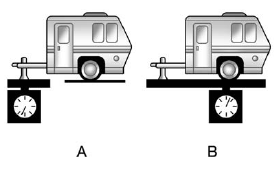Weight of the Trailer Tongue
The tongue load (A) of any trailer is an important weight to measure because it affects the total gross weight of the vehicle. The Gross Vehicle Weight (GVW) includes the curb weight of the vehicle, any cargo carried in it, and the people who will be riding in the vehicle.
If there are a lot of options, equipment, passengers or cargo in the vehicle, it will reduce the tongue weight the vehicle can carry, which will also reduce the trailer weight the vehicle can tow. If towing a trailer, the tongue load must be added to the GVW because the vehicle will be carrying that weight, too.
See Vehicle Load Limits for more information about the vehicle's maximum load capacity.

For a weight-carrying hitch, the trailer tongue (A) should weigh 10 to 15 percent of the total loaded trailer weight (B).
After loading the trailer, weigh the trailer and then the tongue, separately, to see if the weights are proper. If they are not, adjustments might be made by moving some items around in the trailer.
See also:
Parking on Hills
WARNING
Parking the vehicle on a hill with the trailer attached can be dangerous. If
something goes wrong, the rig could start to move.
People can be injured, and both the vehicle and the trailer ...
Return to Factory Settings
Select Return to Factory Settings to return all of the vehicle
personalization to the default settings. Turn the knob to select Yes or No.
Press the knob to confirm and go back to the last menu. ...
Hill and Mountain Roads
Driving on steep hills or through mountains is different than driving on
flat or rolling terrain. Tips for driving in these conditions include:
- Keep the vehicle serviced and in good shape.
- ...






